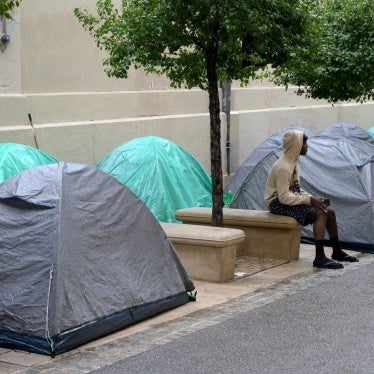Tatjana is 47, but she can’t travel to Austria to visit her daughter without permission from her legal guardian. In fact, she can’t even leave the town in Croatia where she lives without approval. It’s the same if she wants to move to another house, sign an employment contract, or even publish her poems. There’s a lot she can’t do without first seeking permission from her guardian.
Tatjana was diagnosed with schizophrenia in her early 30s and has been in and out of psychiatric hospitals since then. In 2005 she was forced to live in an institution. She spent nine years there.
Today, Tatjana lives in an apartment in town. And while she can take care of herself, the state still requires a legal guardian to hold sway over fundamental life decisions, she told the Human Rights Watch research fellow Emina Ćerimović. While guardians are supposed to only oversee decisions with legal consequences, such as signing contracts, our interviews show that guardians in Croatia also limit people’s right to make informal decisions, such as to travel.
More than 8,200 people with intellectual or psychosocial disabilities in Croatia remain in institutions and psychiatric hospitals, new research from Human Rights Watch shows. Like Tatjana, many were institutionalized against their will. Today Croatia is exploring a more progressive way of supporting people with disabilities, and about a quarter of the country’s 46 state institutions have begun moving people out of these homes and into community-based living arrangements.
While Tatjana’s move to an apartment can be seen as a success story, overall progress with moving people into their communities has been limited and slow. And like Tatjana, many people with disabilities remain legally deprived of their right to make decisions about their lives – despite their ability to live independently.
Tatjana’s husband first took her to a psychiatric hospital in 1997. Over the next few years, she was in and out of hospitals, while her marriage crumbled and her young daughter grew up. At one point, Tatjana stopped eating and fell into a coma, and was prescribed strong drugs by a doctor before being sent home. One night after she took her pills, her mother called and couldn’t rouse her, Tatjana said. Her mother then called the police, who broke through her apartment door and took her to the psychiatric hospital.
While she was in the hospital, a social worker told her that the court had taken away her legal capacity and that she would have a guardian. There wasn’t even a hearing. Someone else decided that she would live in an institution.
The institution provided shelter, but not much treatment – only a family doctor, who visited once a week. Tatjana had no privacy, shared a bathroom, and lived by a rigid schedule. She woke up at 6:30, and ate breakfast at 8. After breakfast she went to a workshop, where she crocheted hats or did embroidery. She’d stay there until noon, and after lunch she’d return to the workshop until 3. The doors were locked each night at 8.
But her home had a progressive director, who concluded that living in the community was better for people than living in an institution. He began the process of deinstitutionalization by asking the people in his home to discuss whether they preferred to move out or to stay. They also talked about what they would need to know to live independently. Ultimately, the institution built an apartment where people who planned to move out could re-learn how to cook food, do dishes, wash their clothes, and prepare for life in the community.
Tatjana chose to leave, and now she lives in an apartment with a number of her friends from the home. They accompany each other to doctor’s appointments and support each other. Now, she says, she can go for a walk without permission and go to bed whenever she wants.
But she still answers to her guardian – in her case, a social worker. If she wants to visit her daughter in Austria or mother in Germany, she has to ask her guardian for permission, saying when she plans to leave and come back and answer any other questions the guardian may have. She rarely asks her guardian for anything because “it’s such a procedure,” she says.
Now, with the help of the local center for social welfare, Tatjana has a chance to regain her legal capacity in court, although no date has been set for the hearing. She’s trying not to think about it, and she talks around the question of what she’ll do if she can legally make her own decisions. She’s afraid to assume it will work out, and is terrified that it won’t.

